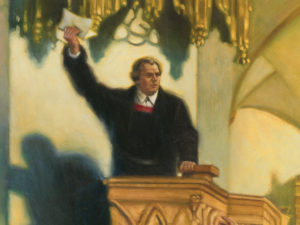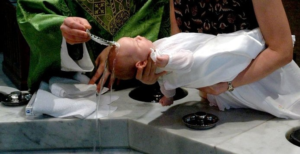by Rev. Christopher Maronde
 The Reformation was, at its core, in its very essence, “missional”. Indeed, had it been anything less, we would know nothing about it today. If Martin Luther had kept his rediscovery of the Gospel to himself, if he had taken comfort in his own soul and left it at that, if he had determined that taking this message to others was not worth the trouble or the cost, then history would have taken an entirely different course. Moreover, had no one determined to publish his writings or distribute them, if none of Luther’s colleagues had traveled throughout Europe to preach the Reformation, if no one had undertaken to testify of the true faith before princes and emperors, then the Gospel that comforted Luther would’ve been snuffed out as soon as it shone out so brightly.
The Reformation was, at its core, in its very essence, “missional”. Indeed, had it been anything less, we would know nothing about it today. If Martin Luther had kept his rediscovery of the Gospel to himself, if he had taken comfort in his own soul and left it at that, if he had determined that taking this message to others was not worth the trouble or the cost, then history would have taken an entirely different course. Moreover, had no one determined to publish his writings or distribute them, if none of Luther’s colleagues had traveled throughout Europe to preach the Reformation, if no one had undertaken to testify of the true faith before princes and emperors, then the Gospel that comforted Luther would’ve been snuffed out as soon as it shone out so brightly.
But from its beginning, the Reformation was missional; it called forth evangelists to carry the sweet message of the Gospel throughout the world, whether to those living under the tyranny of the pope or to those who have never heard the name of Christ. What comforted Luther was not for himself alone, but for all people, of every nation, tribe, language, and people. The message of the Reformation needed to go out, and it did go out, and there it bore much fruit.
This burning desire to bring the Gospel to the nations has always sent forth the heirs of the Reformation to the four corners of the world. How they do this is rooted in Luther’s explanation to the Third Article of the Apostles’ Creed, words that should be memorized by all Christians during this five hundredth anniversary celebration:
 I believe that I cannot by my own reason or strength believe in Jesus Christ, my Lord, or come to Him; but the Holy Spirit has called me by the Gospel, enlightened me with His gifts, sanctified and kept me in the true faith.
I believe that I cannot by my own reason or strength believe in Jesus Christ, my Lord, or come to Him; but the Holy Spirit has called me by the Gospel, enlightened me with His gifts, sanctified and kept me in the true faith.
In the same way He calls, gathers, enlightens, and sanctifies the whole Christian Church on earth, and keeps it with Jesus Christ in the one true faith.
In this Christian Church He daily and richly forgives all my sins and the sins of all believers.
On the Last Day He will raise me and all the dead, and give eternal life to me and all believers in Christ.
This is most certainly true.
 The Church of the Reformation does not pursue mission as if it is her task to convert the nations, to force a decision from those whom she encounters. That is the work of the Holy Spirit, and He uses the Church as His instrument, because to her He has given great gifts. In the Church, the Holy Spirit calls by the Gospel and enlightens by His gifts, namely the Sacraments. Thus, the mission of the Church will take place through preaching the Word and administering the Sacraments; in other words, the same thing that happens at thousands of local congregations every Sunday. The Reformation was first spread through preaching and teaching, through the spoken and the written word, and nothing has really changed in how it continues to spread. Outward appearances may be different, in the sixteenth century or today, in Africa or America, but it is the same Gospel and the same Sacraments that the Holy Spirit uses to make Christians.
The Church of the Reformation does not pursue mission as if it is her task to convert the nations, to force a decision from those whom she encounters. That is the work of the Holy Spirit, and He uses the Church as His instrument, because to her He has given great gifts. In the Church, the Holy Spirit calls by the Gospel and enlightens by His gifts, namely the Sacraments. Thus, the mission of the Church will take place through preaching the Word and administering the Sacraments; in other words, the same thing that happens at thousands of local congregations every Sunday. The Reformation was first spread through preaching and teaching, through the spoken and the written word, and nothing has really changed in how it continues to spread. Outward appearances may be different, in the sixteenth century or today, in Africa or America, but it is the same Gospel and the same Sacraments that the Holy Spirit uses to make Christians.
 And these Christians are to be gathered into the Church. That is another of the Holy Spirit’s works: gathering. The task of missions is to gather those who have been made Christians through the Holy Spirit’s work into the Church, to anchor them to pulpit, font, and altar. Thus, the training and sending of pastors is central to the work of mission. The Reformers actively discouraged people from forming “secret societies” in the woods; those enlightened by the Gospel were to gather where that Gospel was publicly proclaimed, where sins are forgiven.
And these Christians are to be gathered into the Church. That is another of the Holy Spirit’s works: gathering. The task of missions is to gather those who have been made Christians through the Holy Spirit’s work into the Church, to anchor them to pulpit, font, and altar. Thus, the training and sending of pastors is central to the work of mission. The Reformers actively discouraged people from forming “secret societies” in the woods; those enlightened by the Gospel were to gather where that Gospel was publicly proclaimed, where sins are forgiven.
 That is what missions, that is what the Church, that is what pastors are for: forgiving sins. Other tasks can be done by the Church and its preachers, but if sins are not being forgiven, it cannot bear the label of missions. Indeed, that is what Luther was desperately searching for, and what he was so desperate and eager to bring to the world once it had been revealed to Him: the forgiveness of sins by Christ’s blood alone, given to us in sheer grace alone, received by faith alone, proclaimed to the world by the preaching of the Scripture alone.
That is what missions, that is what the Church, that is what pastors are for: forgiving sins. Other tasks can be done by the Church and its preachers, but if sins are not being forgiven, it cannot bear the label of missions. Indeed, that is what Luther was desperately searching for, and what he was so desperate and eager to bring to the world once it had been revealed to Him: the forgiveness of sins by Christ’s blood alone, given to us in sheer grace alone, received by faith alone, proclaimed to the world by the preaching of the Scripture alone.
The Rev. Christopher Maronde is associate pastor of Good Shepherd Lutheran Church, Lincoln, Neb. and president of the St. Philip Lutheran Mission Society.
